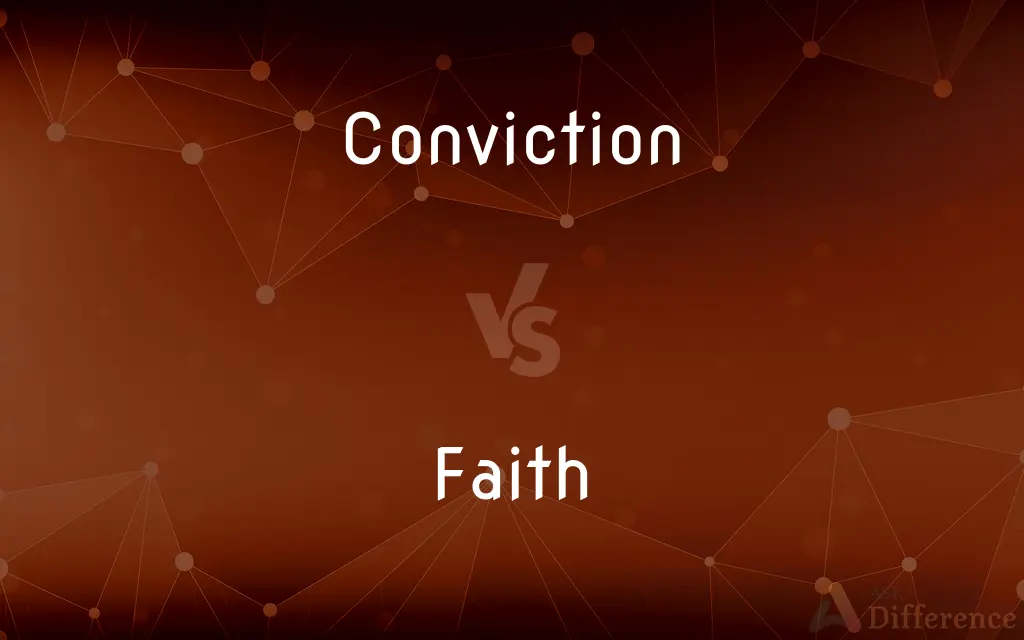Conviction vs. Faith — What's the Difference?
By Maham Liaqat & Fiza Rafique — Updated on April 20, 2024
Conviction involves a firmly held belief supported by evidence or argument, while faith typically refers to strong belief based on spiritual apprehension rather than proof.

Difference Between Conviction and Faith
Table of Contents
ADVERTISEMENT
Key Differences
Conviction often requires evidence or reasoning to firmly establish a belief in someone's mind. It commonly relates to legal or intellectual contexts where proofs are crucial. On the other hand, faith usually transcends the need for empirical evidence, emphasizing belief in religious, spiritual, or personal convictions without requiring tangible proof.
People with strong convictions are typically seen as rational and logical, as their beliefs are often grounded in observable realities and logical deductions. Whereas, individuals with deep faith might prioritize spiritual or emotional insights over empirical data, valuing personal or religious experiences as foundational to their beliefs.
In the realm of law, conviction specifically refers to a formal declaration that someone is guilty of a criminal offense, made by the verdict of a jury or the decision of a judge. On the other hand, faith does not involve judicial processes but is deeply rooted in personal or communal religious contexts.
Conviction can change if new evidence or arguments are presented, reflecting its basis in logical reasoning and factual verification. Conversely, faith often remains steadfast even in the face of contradictory evidence, emphasizing its foundation in unshakeable personal or spiritual truths.
While conviction is often openly discussed and debated in public forums or educational settings, encouraging scrutiny and analysis, faith is more personal and may not be as frequently subjected to public evaluation, often being considered a more private aspect of one's life.
ADVERTISEMENT
Comparison Chart
Basis
Evidence and reasoning
Spiritual apprehension, personal belief
Context
Often legal, intellectual
Religious, spiritual, personal
Changeability
Subject to change with new evidence
Often steadfast despite new evidence
Public Discussion
Commonly debated and analyzed
Less frequently subjected to public scrutiny
Emphasis
Logical deduction and proof
Belief and trust beyond empirical evidence
Compare with Definitions
Conviction
A firmly held belief or opinion.
His conviction that the plan will work is contagious.
Faith
Firm belief in something for which there is no proof.
His faith that his friend will recover is unwavering.
Conviction
The act of declaring someone guilty of a crime.
The conviction of the defendant was expected.
Faith
Complete trust or confidence in someone or something.
She put her faith in the new system, hoping it would improve efficiency.
Conviction
A personal belief derived from one's own experience or reflection.
Her environmental convictions influence her lifestyle.
Faith
Loyalty to a person or duty.
He demonstrated his faith through years of service.
Conviction
The state of being convinced or having a strong persuasion.
He spoke with conviction about his scientific discoveries.
Faith
A particular religion.
They belong to different faiths but respect each other's views.
Conviction
Determination or resolve strengthened by certainty.
She pursued her goals with a rare conviction.
Faith
Strong belief in God or in the doctrines of a religion.
His faith in the divine guides his actions.
Conviction
In law, a conviction is the verdict that usually results when a court of law finds a defendant guilty of a crime. The opposite of a conviction is an acquittal (that is, "not guilty").
Faith
Faith, derived from Latin fides and Old French feid, is confidence or trust in a person, thing, or concept. In the context of religion, one can define faith as "belief in a god or in the doctrines or teachings of religion".
Conviction
The judgment of a jury or judge that a person is guilty of a crime as charged.
Faith
Belief in God or in a set of religious doctrines.
Conviction
The state of being found or proved guilty
Evidence that led to the suspect's conviction.
Faith
A set of religious doctrines; a body of dogma
Adhered to the Muslim faith.
Conviction
The act or process of convincing.
Faith
Often Faith(Christianity)Secure belief in God and a trusting acceptance of God's will viewed as a theological virtue.
Conviction
The state or appearance of being convinced
She spoke with real conviction on the matter.
Faith
Confident or unquestioning belief in the truth, value, or trustworthiness of a person, idea, or thing.
Conviction
A fixed or strong belief.
Faith
Loyalty to a person or thing; allegiance
Keeping faith with one's supporters.
Refused to break faith with his friends.
Conviction
(countable) A firmly held belief.
Faith
A trust or confidence in the intentions or abilities of a person, object, or ideal from prior empirical evidence.
The faithfulness of Old Faithful gives us faith in it.
I have faith in the goodness of my fellow man.
You need to have faith in yourself, that you can overcome your shortcomings and become a good person.
Conviction
(countable) A judgement of guilt in a court of law.
Faith
A conviction about abstractions, ideas, or beliefs, without empirical evidence, experience, or observation.
I have faith that my prayers will be answered.
I have faith in the healing power of crystals.
Conviction
(uncountable) The state of being found or proved guilty.
Faith
A religious or spiritual belief system.
The Christian faith.
We seek justice for the Indo-European Folk Faith; what's wrong in our literature for that?
Conviction
(uncountable) The state of being wholly convinced.
Faith
An obligation of loyalty or fidelity and the observance of such an obligation.
He acted in good faith to restore broken diplomatic ties after defeating the incumbent.
Conviction
The act of convicting; the act of proving, finding, or adjudging, guilty of an offense.
The greater certainty of conviction and the greater certainty of punishment.
Faith
(obsolete) Credibility or truth.
Conviction
A judgment of condemnation entered by a court having jurisdiction; the act or process of finding guilty, or the state of being found guilty of any crime by a legal tribunal.
Conviction may accrue two ways.
Faith
(archaic) really, truly
Conviction
The act of convincing of error, or of compelling the admission of a truth; confutation.
For all his tedious talk is but vain boast,Or subtle shifts conviction to evade.
Faith
Belief; the assent of the mind to the truth of what is declared by another, resting solely and implicitly on his authority and veracity; reliance on testimony.
Conviction
The state of being convinced or convicted; strong persuasion or belief; especially, the state of being convicted of sin, or by one's conscience.
To call good evil, and evil good, against the conviction of their own consciences.
And did you presently fall under the power of this conviction?
Faith
The assent of the mind to the statement or proposition of another, on the ground of the manifest truth of what he utters; firm and earnest belief, on probable evidence of any kind, especially in regard to important moral truth.
Faith, that is, fidelity, - the fealty of the finite will and understanding to the reason.
Conviction
An unshakable belief in something without need for proof or evidence
Faith
The belief in the historic truthfulness of the Scripture narrative, and the supernatural origin of its teachings, sometimes called historical and speculative faith.
Without faith it is impossible to please him [God].
The faith of the gospel is that emotion of the mind which is called "trust" or "confidence" exercised toward the moral character of God, and particularly of the Savior.
Faith is an affectionate, practical confidence in the testimony of God.
Conviction
(criminal law) a final judgment of guilty in a criminal case and the punishment that is imposed;
The conviction came as no surprise
Faith
That which is believed on any subject, whether in science, politics, or religion; especially (Theol.), a system of religious belief of any kind; as, the Jewish or Mohammedan faith; the Christian faith; also, the creed or belief of a Christian society or church.
Which to believe of her,Must be a faith that reason without miracleCould never plant in me.
Now preacheth the faith which once he destroyed.
Faith
Fidelity to one's promises, or allegiance to duty, or to a person honored and beloved; loyalty.
Children in whom is no faith.
Whose failing, while her faith to me remains,I should conceal.
Faith
Word or honor pledged; promise given; fidelity; as, he violated his faith.
For you aloneI broke me faith with injured Palamon.
Faith
Credibility or truth.
The faith of the foregoing narrative.
Faith
By my faith; in truth; verily.
Faith
A strong belief in a supernatural power or powers that control human destiny;
He lost his faith but not his morality
Faith
Complete confidence in a person or plan etc;
He cherished the faith of a good woman
The doctor-patient relationship is based on trust
Faith
Institution to express belief in a divine power;
He was raised in the Baptist religion
A member of his own faith contradicted him
Faith
Loyalty or allegiance to a cause or a person;
Keep the faith
They broke faith with their investors
Common Curiosities
How does faith influence daily life?
Faith can profoundly impact daily life by providing a moral and ethical framework and offering comfort and guidance in personal and communal activities.
How does conviction influence behavior?
Conviction can strongly influence behavior by motivating actions that align with firmly held beliefs and evidence-based conclusions.
Can a person have both conviction and faith?
Yes, a person can possess both conviction in some areas, like science or law, and faith in spiritual or religious domains.
Is faith rational?
Faith may not always be considered rational in the traditional sense, as it does not require empirical evidence to justify beliefs.
Is conviction only applicable in legal contexts?
While commonly used in legal contexts to mean a formal guilty verdict, conviction can also refer more broadly to any strongly held belief.
What is the main difference between conviction and faith?
Conviction is a belief grounded in evidence or reasoning, while faith often involves belief without empirical proof, based more on spiritual understanding.
What role does faith play in a community?
Faith often plays a central role in community bonding and cultural practices, influencing values, traditions, and communal support systems.
What can cause a change in conviction?
New evidence, experiences, or persuasive arguments can lead to a change in conviction.
How are conviction and faith treated differently in society?
Conviction is often subject to public debate and scrutiny, whereas faith is usually a more personal matter and less frequently discussed openly.
Can faith exist without religion?
Yes, faith can exist as trust or confidence in various aspects of life, not necessarily tied to religious belief.
Share Your Discovery

Previous Comparison
Judge vs. Try
Next Comparison
House vs. CottageAuthor Spotlight
Written by
Maham LiaqatCo-written by
Fiza RafiqueFiza Rafique is a skilled content writer at AskDifference.com, where she meticulously refines and enhances written pieces. Drawing from her vast editorial expertise, Fiza ensures clarity, accuracy, and precision in every article. Passionate about language, she continually seeks to elevate the quality of content for readers worldwide.
















































